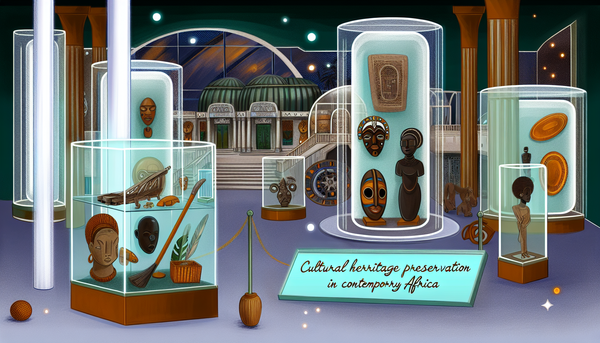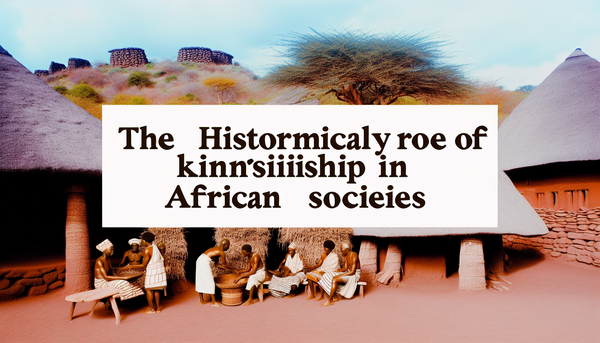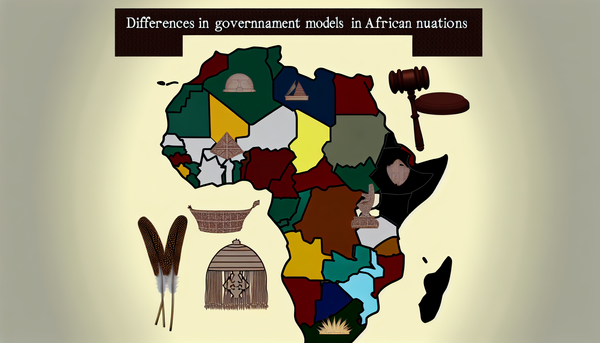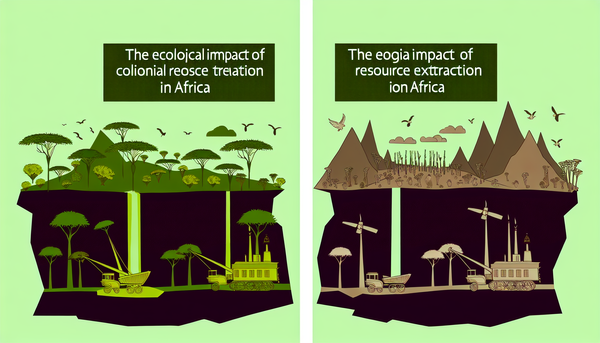The Role of Women in Pre-Colonial African Societies
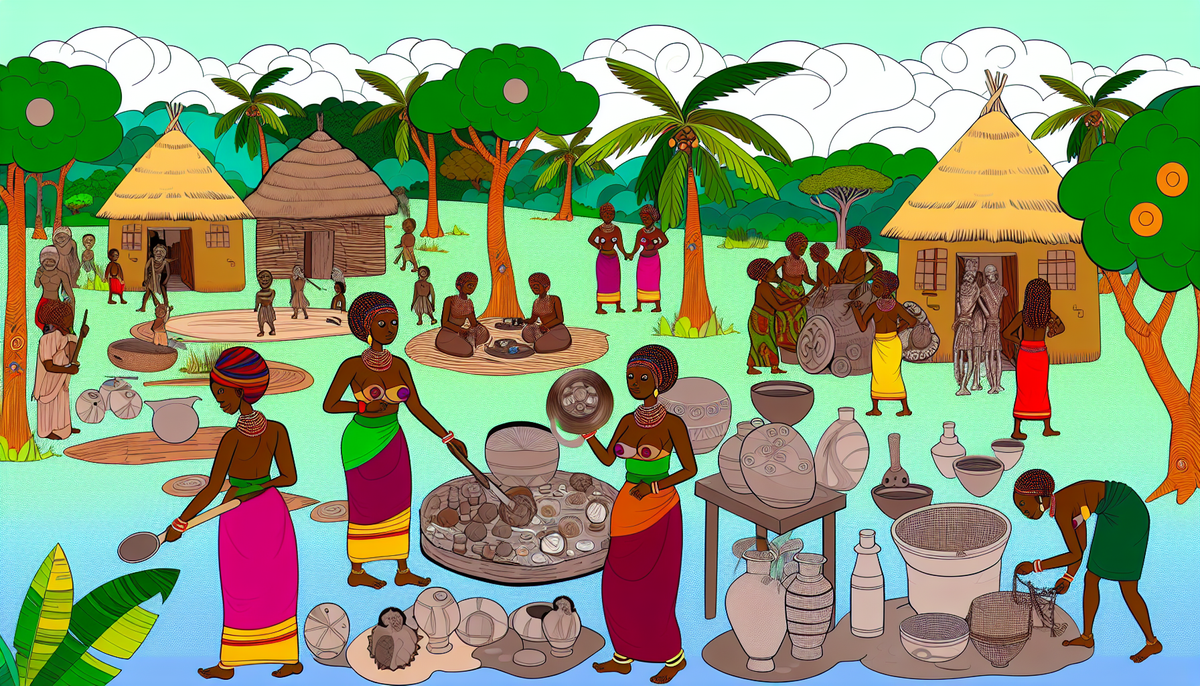
Introduction to Gender Roles and Social Structures
The exploration of women's roles in pre-colonial African societies offers a fascinating glimpse into the intricate social fabric of diverse communities across the continent. In these societies, gender roles were defined by a complex interplay of cultural, economic, and spiritual factors. Women often held significant positions within their communities, contributing to various aspects of social life.
One remarkable feature of pre-colonial African societies was the diversity of gender roles and the nuanced ways in which women participated in different spheres. While specific roles varied from region to region, women commonly played crucial roles in agricultural activities, trade, and artisanal work. Their contributions to the economic prosperity of their communities were profound and often overlooked in historical narratives.
Moreover, women in many pre-colonial African societies held respected positions within the political and spiritual realms. Some societies had female leaders who wielded political power and influence, challenging Western stereotypes of women's inferior status in traditional African societies. Additionally, women often played essential roles in traditional religious practices, acting as priestesses, healers, or spiritual leaders.
Understanding the complexities of gender roles in pre-colonial African societies requires a nuanced examination of social structures and historical contexts. By delving into the multifaceted roles played by women in these societies, we gain a deeper appreciation for the rich diversity and contributions of African women throughout history. This exploration sets the stage for a more comprehensive understanding of the evolving dynamics of gender roles in African societies over time.
Political Influence and Leadership Forms
In pre-colonial African societies, women wielded significant political influence and held esteemed leadership roles that challenged conventional Western notions of male-dominated power structures. While the specific forms of female leadership varied across different societies, women's participation in political decision-making processes was widespread and integral to community governance.
One notable aspect of women's political influence in pre-colonial African societies was their involvement in both formal and informal leadership roles. Some societies recognized female chiefs or queens who held authority over their communities and played key roles in mediating conflicts, making decisions, and representing their people in external affairs. These female leaders often commanded respect and held considerable power within their societies.
Additionally, women's political influence extended beyond formal leadership positions to encompass informal spheres of influence and decision-making processes. Women participated in councils, councils of elders, and other decision-making bodies where their input and perspectives were valued and respected. Their roles in these spaces were not merely symbolic but carried real authority and influence over communal affairs.
The diverse forms of female political influence in pre-colonial African societies challenge stereotypes and misconceptions about gender roles and power dynamics in traditional African communities. By recognizing and examining the significant roles played by women in political leadership, we gain a deeper understanding of the complex social structures and dynamics that shaped these societies. This exploration highlights the diverse ways in which women contributed to governance, diplomacy, and community welfare in pre-colonial Africa.
Economic Contributions and Trade Practices
Women in pre-colonial African societies made substantial economic contributions and played vital roles in trade practices that were essential for the prosperity and sustainability of their communities. Their involvement in economic activities went beyond domestic chores and subsistence farming, encompassing roles in entrepreneurship, artisanal production, and commercial exchanges.
One of the significant economic contributions of women in pre-colonial African societies was their involvement in various aspects of trade. Women were active participants in local and long-distance trade networks, engaging in the exchange of goods, services, and commodities that facilitated economic growth and cultural exchange. Their roles as traders, market vendors, and intermediaries were crucial for connecting different regions and enhancing the economic interconnectedness of African societies.
Moreover, women's economic activities extended to artisanal production, where they showcased their skills in crafting pottery, textiles, jewelry, and other goods that were highly valued in local and regional markets. The entrepreneurial spirit of women in pre-colonial African societies often led to the development of specialized skills and innovative practices that contributed to the diversification and growth of economic activities.
By recognizing the economic contributions and trade practices of women in pre-colonial African societies, we gain a deeper appreciation for their agency, resourcefulness, and entrepreneurial capabilities. The integration of women into various economic sectors and trade networks played a pivotal role in the development and prosperity of African communities, laying the foundation for dynamic and vibrant economies that thrived on diversity and ingenuity.
Spiritual Roles and Religious Significance
In pre-colonial African societies, women held significant spiritual roles and their contributions to religious practices were deeply intertwined with the cultural and social fabric of their communities. Women served as priestesses, healers, custodians of sacred knowledge, and mediators between the human and spiritual realms, playing pivotal roles in maintaining spiritual balance and harmony.
One of the prominent spiritual roles of women in pre-colonial Africa was that of priestesshood, where women served as intermediaries between the community and the divine. Priestesses presided over rituals, ceremonies, and offerings, invoking spiritual blessings, protection, and guidance for the welfare of the community. Their deep connection to the spiritual world and their ability to communicate with ancestral spirits were revered and respected by their societies.
Women also played crucial roles as healers and traditional medical practitioners, using their knowledge of herbs, healing rituals, and divination techniques to address physical, emotional, and spiritual ailments. Their expertise in treating various conditions and their holistic approach to healing were integral to the well-being and health of their communities.
Furthermore, women were often the custodians of sacred knowledge, oral traditions, and religious practices that were passed down through generations. Their role in preserving and transmitting cultural wisdom, spiritual teachings, and ritual practices ensured the continuity and integrity of traditions that shaped the collective identity and beliefs of their societies.
The spiritual roles and religious significance of women in pre-colonial African societies highlight the central role of women in shaping and upholding the spiritual and cultural heritage of their communities. Their contributions to religious practices, healing arts, and knowledge transmission were essential for the cohesion, resilience, and vitality of African societies, reflecting their deep-rooted connection to the spiritual dimensions of life.
Kinship and Matrilineal Inheritance
Kinship systems in pre-colonial African societies often exhibited a complex interplay of social norms, traditions, and intergenerational relationships that emphasized the importance of familial ties and lineage. Matrilineal inheritance, in particular, played a significant role in shaping kinship structure and determining rights to property, status, and leadership within communities.
Matrilineal inheritance was a prevalent practice in many pre-colonial African societies, where descent, inheritance, and kinship were traced through the maternal line. In matrilineal systems, children typically inherited property, titles, and social status from their mothers' lineage, fostering strong connections to maternal relatives and emphasizing the maternal side of the family as the primary source of identity and belonging.
Women held prominent positions within matrilineal kinship systems, serving as the custodians of lineage, the transmitters of ancestral knowledge, and the arbiters of inheritance rights. Through matrilineal descent, women played essential roles in preserving family histories, maintaining ancestral ties, and ensuring the continuity of lineage across generations.
The practice of matrilineal inheritance not only shaped familial relations but also influenced broader social structures, including political organization, economic arrangements, and community cohesion. Matrilineal kinship systems provided a framework for familial solidarity, mutual support, and the intergenerational transmission of cultural values and traditions.
By exploring the dynamics of kinship and matrilineal inheritance in pre-colonial African societies, we gain insights into the intricate ways in which familial relationships, inheritance practices, and social organization were intertwined. The importance of maternal lineage and women's roles in shaping kinship structures highlight the complexity and richness of traditional African systems of descent and inheritance.
Educational Roles and Knowledge Transmission
Education and knowledge transmission in pre-colonial African societies were integral components of socialization, cultural preservation, and community development. Women played crucial roles in educational practices, imparting wisdom, skills, and values to younger generations through formal and informal means, thus ensuring the continuity of traditions and collective knowledge.
In many pre-colonial African societies, women served as primary educators within the family and community settings, where they were responsible for teaching children essential skills, values, and cultural practices. Through storytelling, songs, proverbs, and hands-on activities, women instilled important lessons about history, morality, craftsmanship, and societal norms, shaping the intellectual and moral development of children.
Women's educational roles extended beyond the domestic sphere to include formal apprenticeships, mentorship programs, and specialized training in various crafts, arts, and spiritual practices. Women excelled as teachers, healers, diviners, and ritual specialists, passing down specialized knowledge and skills to future generations and ensuring the preservation of cultural traditions.
Additionally, women were the custodians of oral traditions, folklore, and indigenous knowledge systems that encompassed a wide range of subjects, from agriculture and medicinal practices to astronomy and spirituality. Through oral storytelling, performances, and ritual ceremonies, women preserved and transmitted valuable knowledge that formed the foundation of communal identity and collective memory.
The educational roles and knowledge transmission practices led by women in pre-colonial African societies were instrumental in nurturing intellectual curiosity, promoting cultural literacy, and fostering a sense of interconnectedness within communities. The legacy of women as educators, knowledge bearers, and cultural stewards underscores the vital role they played in shaping the intellectual landscape and ensuring the preservation of traditional wisdom in African societies.
Conclusion: Evolving Perceptions and Historical Perspectives
The examination of women's roles in pre-colonial African societies offers a nuanced and multifaceted understanding of gender dynamics, societal structures, and cultural practices that have shaped African history. By acknowledging the diverse and significant contributions of women in political, economic, spiritual, kinship, and educational spheres, we challenge simplistic narratives and stereotypes that have marginalized the voices and experiences of African women.
The historical perspectives on women in pre-colonial Africa reveal a complex tapestry of agency, resilience, and innovation that defy Western-centric notions of gender roles and power dynamics. Women in African societies held leadership positions, engaged in trade practices, conducted spiritual ceremonies, shaped kinship structures, and transmitted knowledge across generations, demonstrating their indispensable roles in community building and cultural continuity.
As we reflect on the evolving perceptions of women's roles in pre-colonial African societies, it is essential to recognize the enduring legacy of women as agents of change, wisdom, and cultural heritage. Their contributions have enriched African societies, fostered social cohesion, and sustained traditions that continue to resonate in contemporary African narratives.
Moving forward, it is paramount to elevate the voices and experiences of African women in historical discourse, education, and representation, ensuring that their diverse contributions are acknowledged, valued, and celebrated. By reexamining pre-colonial African societies through a gender-inclusive lens, we not only honor the resilience and agency of women but also deepen our appreciation for the rich tapestry of African history and culture.
